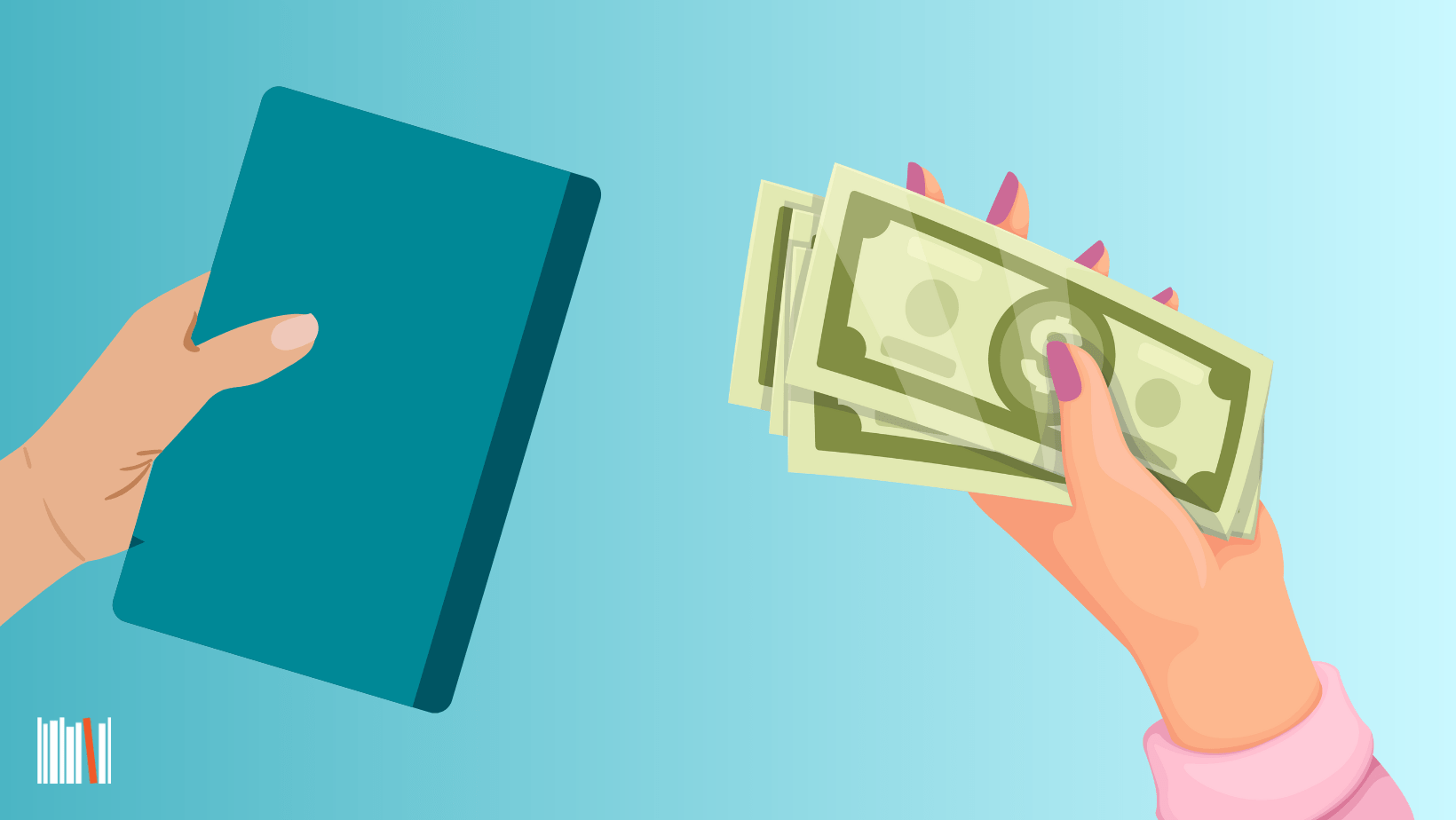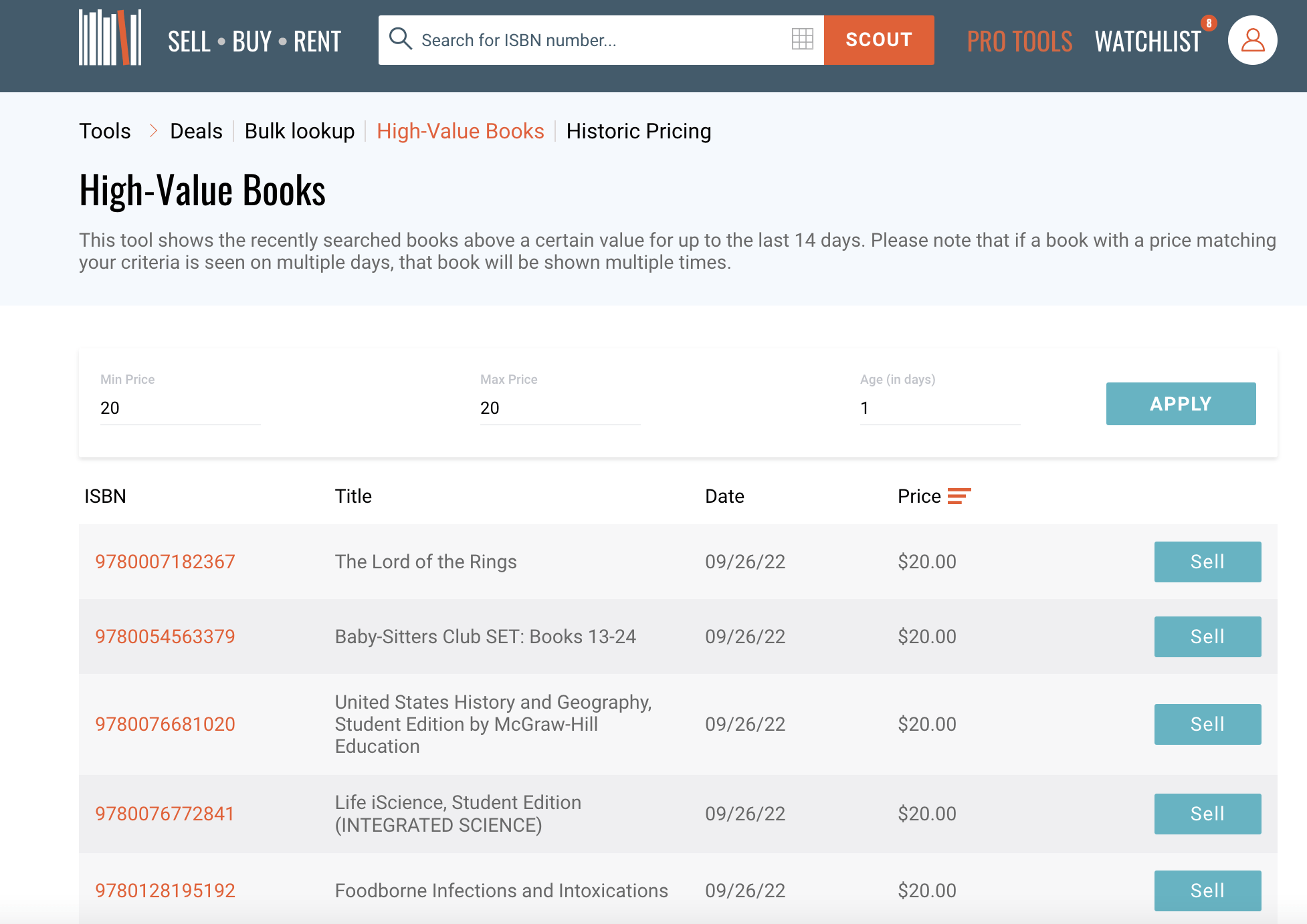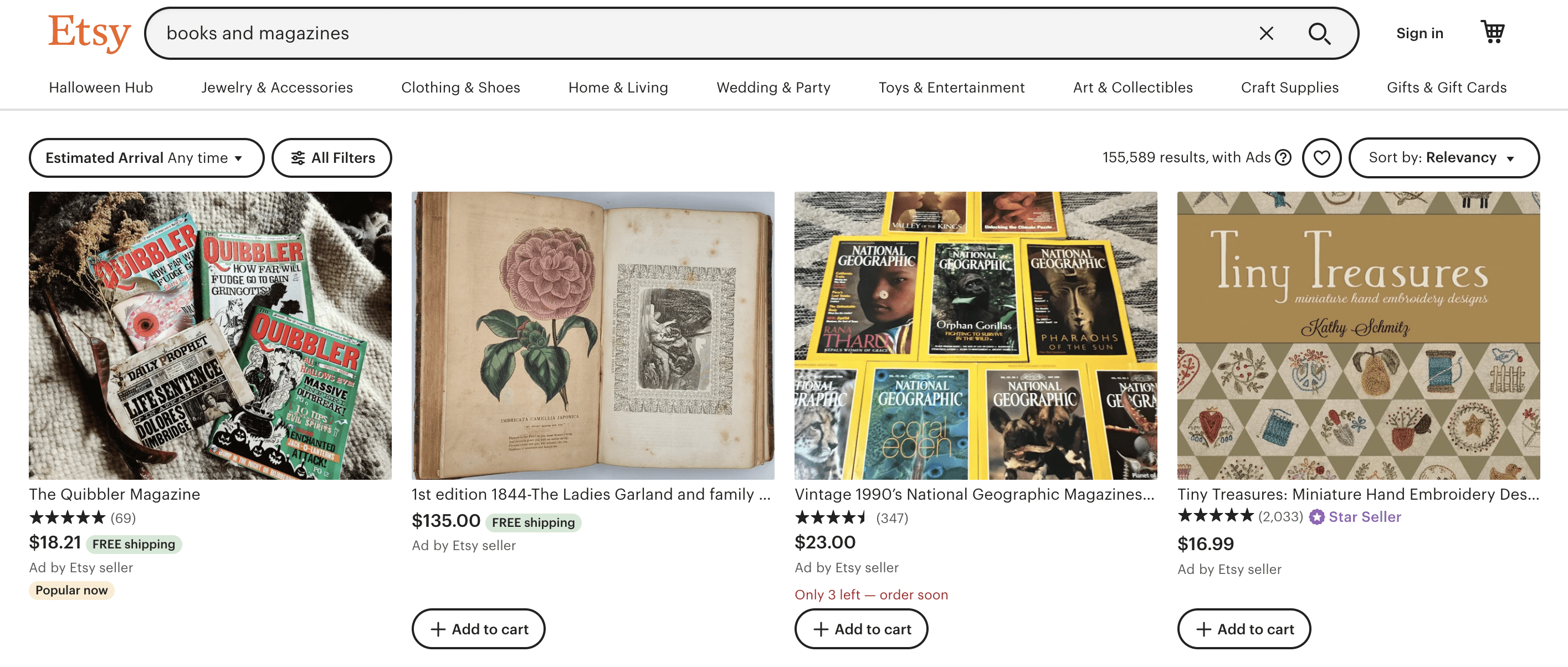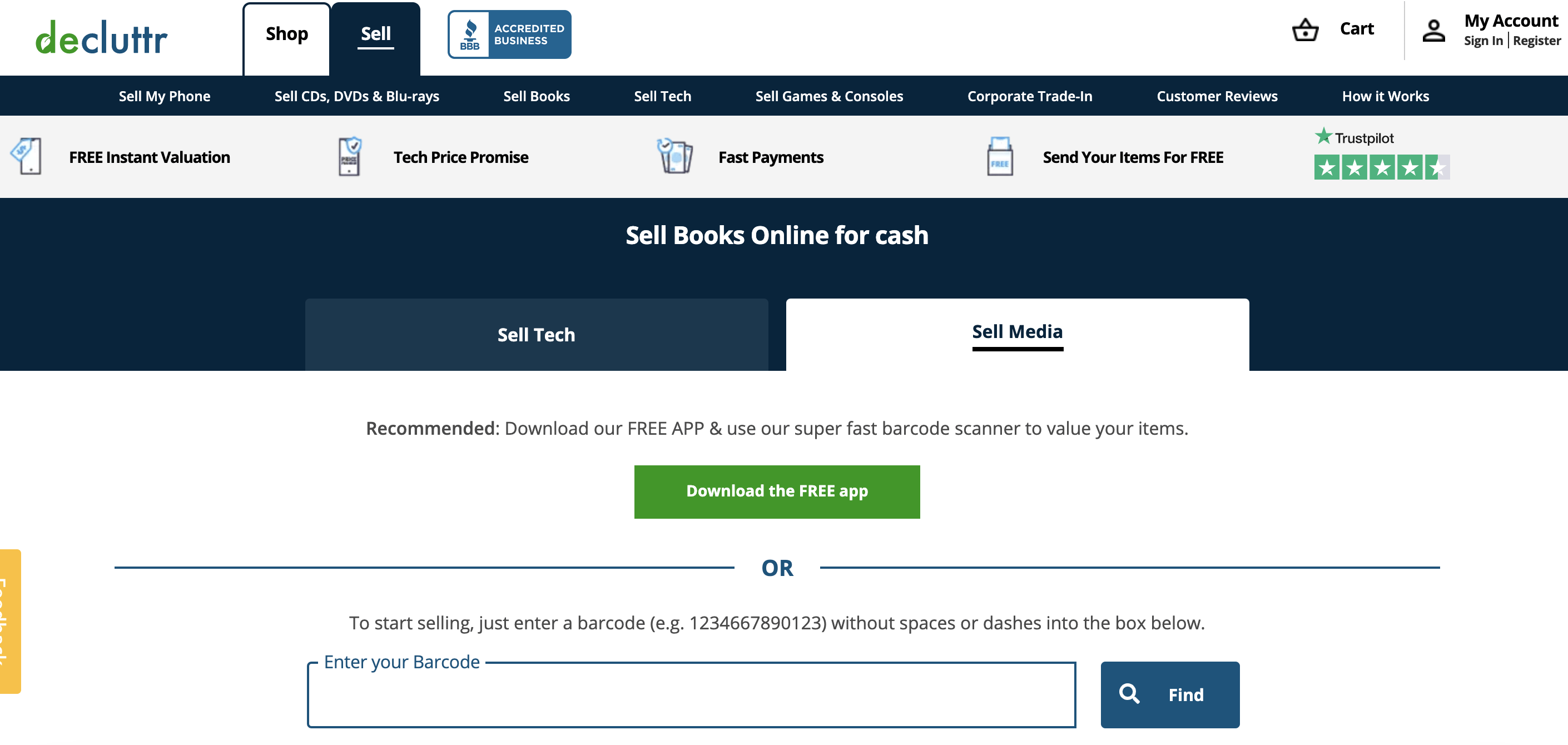
Let’s say you’ve decided to clean up a bit of space and decided to get rid of some old popular psychology books, some cookbooks you never really opened, your old Twilight copy (you definitely won’t read it again!), and a few anatomy textbooks that are simply collecting dust on your shelves. Great idea—you can make use of them to earn extra cash!
So, how do I sell my books for cash? In this guide, we’ve prepared six tips on how you can sell your used books to get the most profit.
- Tip #1: Find the Best Places to Sell Used Books Online
- Tip #2: Find the Best Places to Sell Used Books in Person
- Tip #3: How to Prepare Books for Sale
- Tip #4: Donate
- Tip #5: Recycle
- Tip #6: Learn the Answers to Major Bookselling FAQs
Tip #1: Find the Best Places to Sell Used Books Online
BookScouter

The first thing you should do is go to BookScouter. Instead of manually checking every possible website with a buyback program, you can check only one. With 30+ vendors, BookScouter is the largest bookselling platform where you can see all the deals and find the most profitable offer for your books. You will also get a good idea of whether you should sell your books or just donate them. Perhaps, your Twilight copy won’t bring you a lot of cash (because buyback prices are not the same for all books), or your cookbooks might be of better use to friends and family. Textbooks, however, can be sold quite profitably. Besides, you can also use the Historic Buyback Price Lookup tool to see how much your copy of Foundations of Sport and Exercise Psychology cost in the past and choose the best time to sell it. Cool, isn’t it? BookScouter is an excellent online resource for selling old and second-hand books. Ok, once you’ve detected the best offer, you go to the vendor page and sell your book—it’s simple. That’s why we recommend starting with BookScouter first.
Amazon

If you like more complicated ways, you can go directly to Amazon and try selling your books there. It’s an option; however, we warn you that it’s a lot more complicated, and if you just have a couple or a dozen books, it probably makes little sense. Yet, our job is to provide you with the information, and here it is. To sell your books on Amazon, you need to open an Amazon seller account and provide many personal and payment details. After that, you’ll need to select one of Amazon’s two fulfillment methods:
- Fulfillment by Seller (FBS): You do all the storing, packing, and shipping yourself.
- Fulfillment by Amazon (FBA): You ship all your books to Amazon, and Amazon does the rest.
Besides, you’ll also need to choose between the Individual plan (99 cents per unit sold) and the Professional plan ($39.99 per month). The latter is more advisable if you plan on selling more than 40 books a month. If you don’t, then the Individual plan and FBS are more obvious choices (with more work on your part, of course).
eBay

The same can be said for eBay. It is Amazon’s alternative; however, it comes with strings attached. It has a bidding system that will work exceptionally well if you sell niche, rare, or collectible books as well as textbooks. You will hardly likely get much for your Twilight copy here, yet again.
Etsy

Probably not an obvious choice of a platform to sell books, as we all know it as a place to shop for cute hand-made goods. However, people do sell books on Etsy. To try this option, you need to log in with your Facebook, Google, or Apple account. However, keep in mind that there are many fees associated with this selling method: listing fees (20 cents for each item ), transaction fees (6% of each listing price), advertising and promotional fees, and shipping fees. So before you go to Etsy with your dozen of used books, think again. Perhaps, you’d better recheck our #1 option.
Decluttr

Another possible venue to try and sell your books together with other used items is Decluttr. The website has a separate category: Sell Books. It’s pretty simple: you just enter your book’s ISBN and click “Add” to see the price offer. Mind that you can’t sell less than $5 worth of items; plus, you should include at least ten media items or one tech item. So, this option is perfect if you really want to declutter your house, not just from books. You get paid either by a direct deposit or via PayPal. Alternatively, you can donate your money to charity.
Tip #2: Find the Best Places to Sell Used Books in Person
Powell’s Books

Now, let’s move on to the places where you can sell your used books in person. We’ll start with Powell’s as the most popular option. You can bring your books to them for evaluation, or you can also sell your books online. Powell’s buys back a lot of books, really (see Powell’s reviews on BookScouter).
However, they only accept books in excellent condition. So if this is not the case with your books, you shouldn’t have your hopes high. Instead, check our second-place suggestion.
Half Price Books

If your books are in different conditions, you can try selling them to Half Price Books. Just pack them and bring them for appraisal. Half Price Books are also known for their huge buyback potential; however, they may not offer much. So be prepared to get a few bucks.
Local Bookstores and Book-Buying Markets

If you don’t want to bother packing and sending your books by mail, or if you are lucky to have a local bookstore that accepts used books, go there and ask for their offers. Perhaps, there is a thrift market at the place where you live or a local Facebook group—try selling your books there, too. The latter can be of great help if you have used kids’ books.
For more local options, consider exploring opportunities to sell books in Ashburn, Atlanta, San Diego, Denver, Boston, San Antonio and Florida.
Yard and Garage Sales

Arranging a garage or yard sale may be a cool idea if you want to earn extra cash and socialize at the same time. You won’t probably get much for your books, but we assure you that you’ll have a great time.
Tip #3: How to Prepare Books for Sale
Before you sell your used books, prepare them for sale. After all, you are trying to give them a second life, and other people will be using them after you. So, here are our recommendations:
- Make sure your books are clean and in good (perfect, if possible) condition.
- Be honest about the book’s condition. After all, if you claim that your book is like new and it arrives at a buyback company in good or acceptable condition, you may not get the money you expect. Remember that most vendors don’t accept damaged books or books with missing pages, etc. Such books can be rejected right away. So be thorough before you pack your books and ship them.
- Be careful with book packaging. Make sure you’ve done everything to keep your book intact inside the packaging. Otherwise, it can be received by the vendor in poor condition, and it’ll be your responsibility.
- Unless you ship to buyback vendors who offer free shipping, pay to ship your books.
Tip #4: Donate
If you’ve inspected your used books and decided that none of them are worth spending time packing and shipping, you can just give them away. There are plenty of options where you can donate books; here are some of them:
Libraries
First of all, check your local library. Indeed, libraries don’t accept every book people don’t need. But if you have kids’ books or some recent bestsellers that are likely to be in demand, your local library will be glad to accept your books. Alternatively, you can leave your books at a “little free library,” where people may take a book and leave wherever they like.
Children’s Hospitals
If you have many kids’ books you no longer need, donating them to children’s hospitals can be a good option. Some sick kids spend a lot of time in hospitals, so the books you donate may help them spend their time just a little bit more cheerfully.
Local Charities
Charity organizations like Goodwill and churches also accept donations from time to time. You can visit the Goodwill website to find the donation center near you or check your local charity for the next thrift store or market sale. You can also donate your books to Books to Prisoners—the website that allows you to donate books to local correctional facilities.

Tip #5: Recycle
Some of your old books don’t have value to be donated: they are either too old or in bad condition. You can recycle books; however, check the guidelines published by earth911 or Recyclenow to understand better how to recycle old books. The thing is that not all books can even be recycled. If you want to get rid of old paperbacks, it’s easier. Hardcovers, however, are more problematic to dispose of. Books, heavily damaged by water, can’t be recycled. Check the article on where to recycle your textbooks.
Tip #6: Learn the Answers to Major Bookselling FAQs
How can I find out the best price offers for my used books and textbooks?
On BookScouter, you can check the price offers from over 30 vendors and choose the best one.
What books should I sell?
Textbooks are the most popular and profitable books for reselling. Art books and cookbooks, together with some religious books and non-fiction books, have more chances to sell well, while popular fiction will unlikely bring you good profit.
What to do with the books I can’t sell?
As we’ve already mentioned, the books that are unlikely to be sold can be either donated or recycled. Unfortunately, books in deplorable conditions can only be disposed of with general waste.
What if I decide to sell books as a side hustle?
If you want to become a book reseller, BookScouter can help you navigate through the industry and maximize your profit with the help of Pro Tools. There is no need to do everything on Amazon only; with BookScouter, you can get access to the hot book flipping deals, historic pricing, bulk lookup, and so much more.



